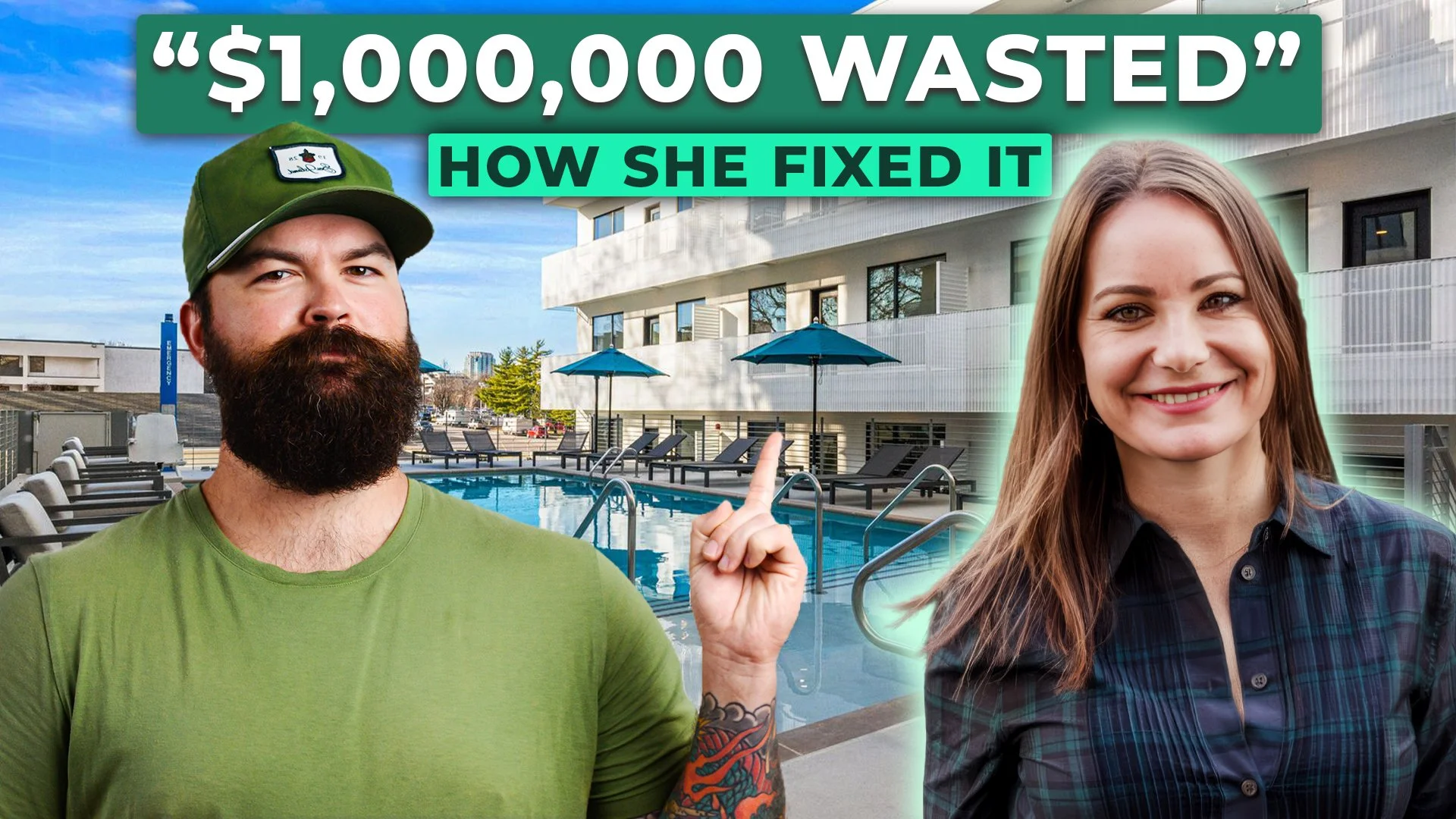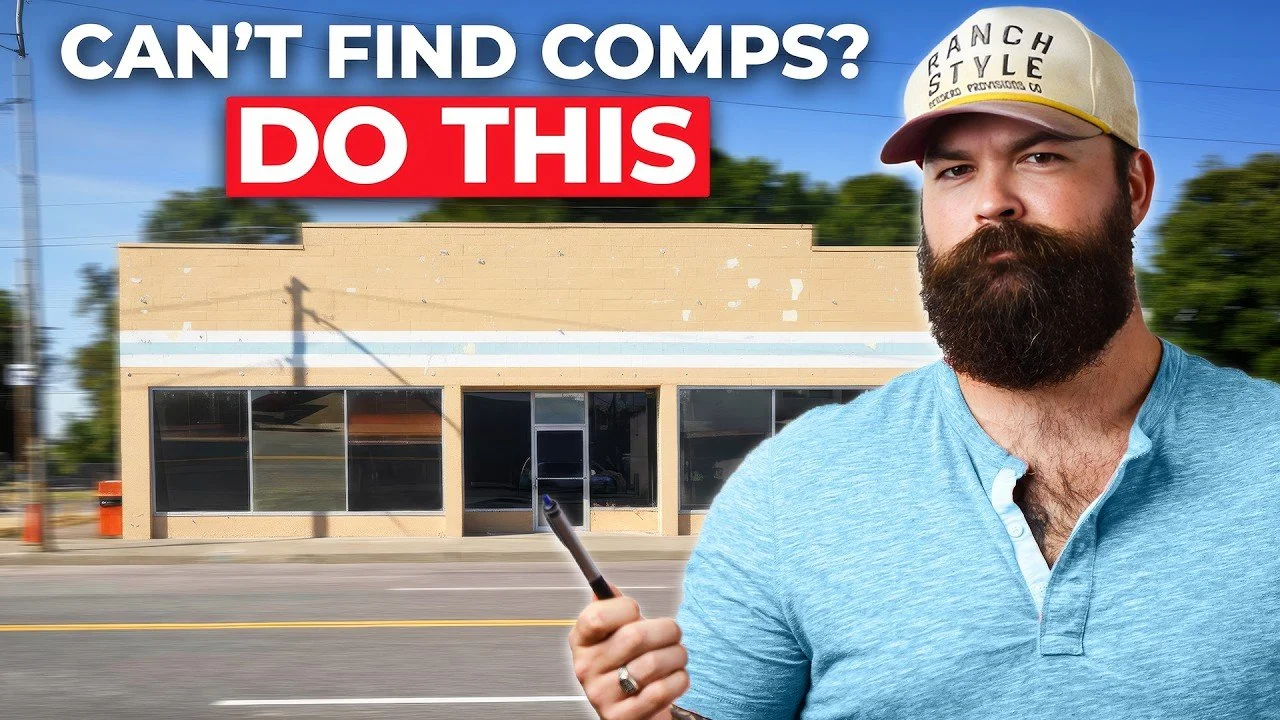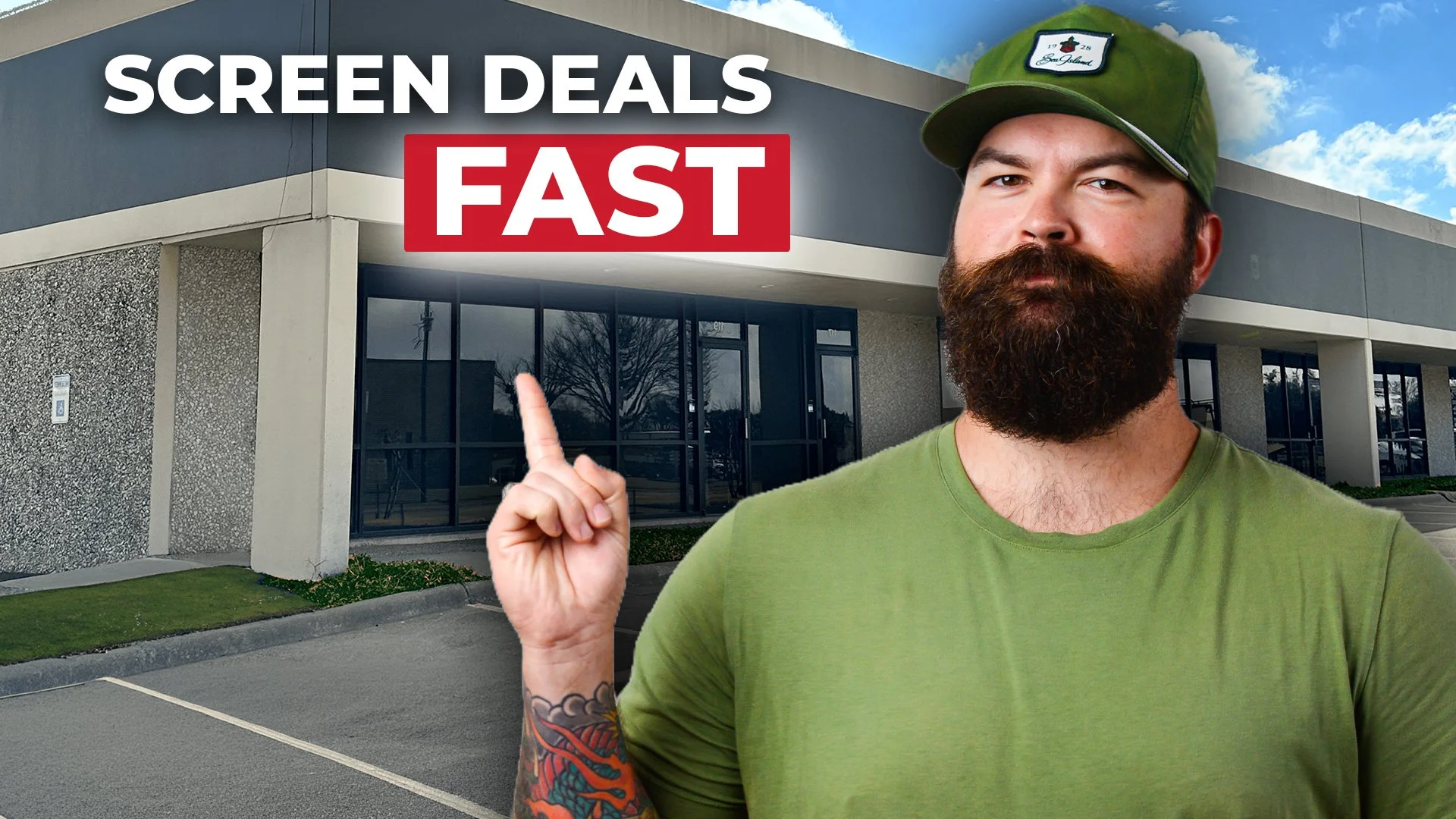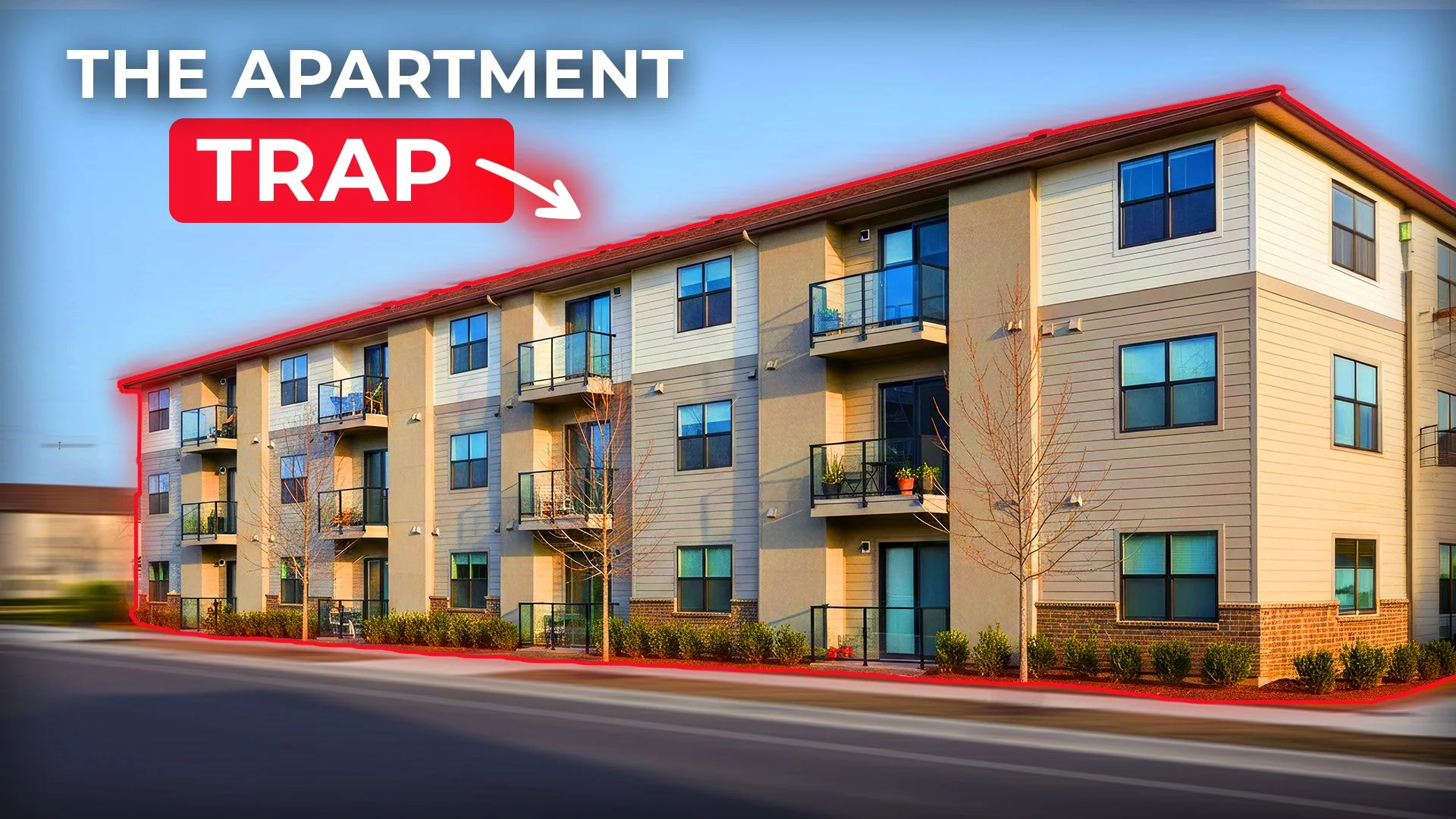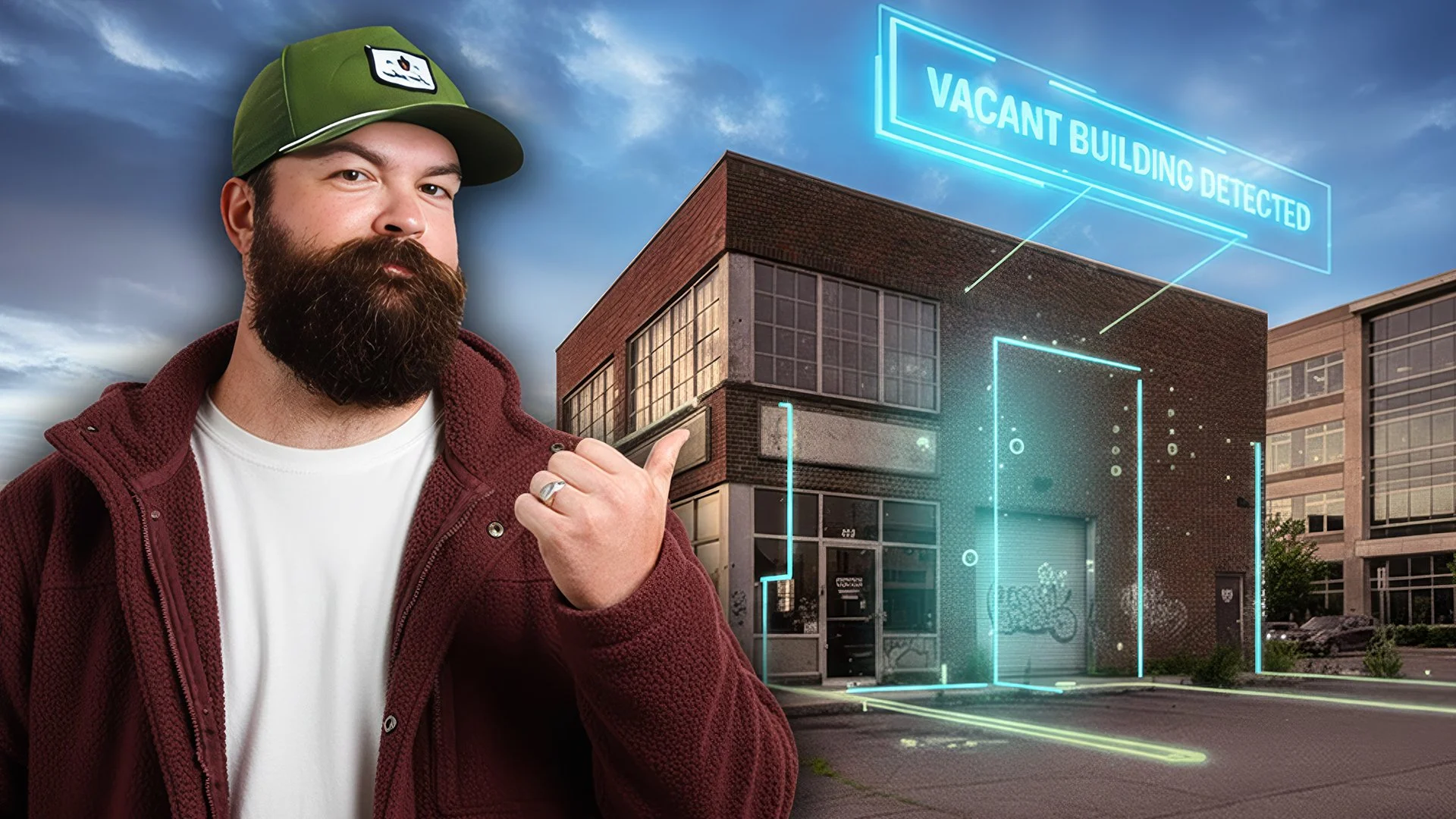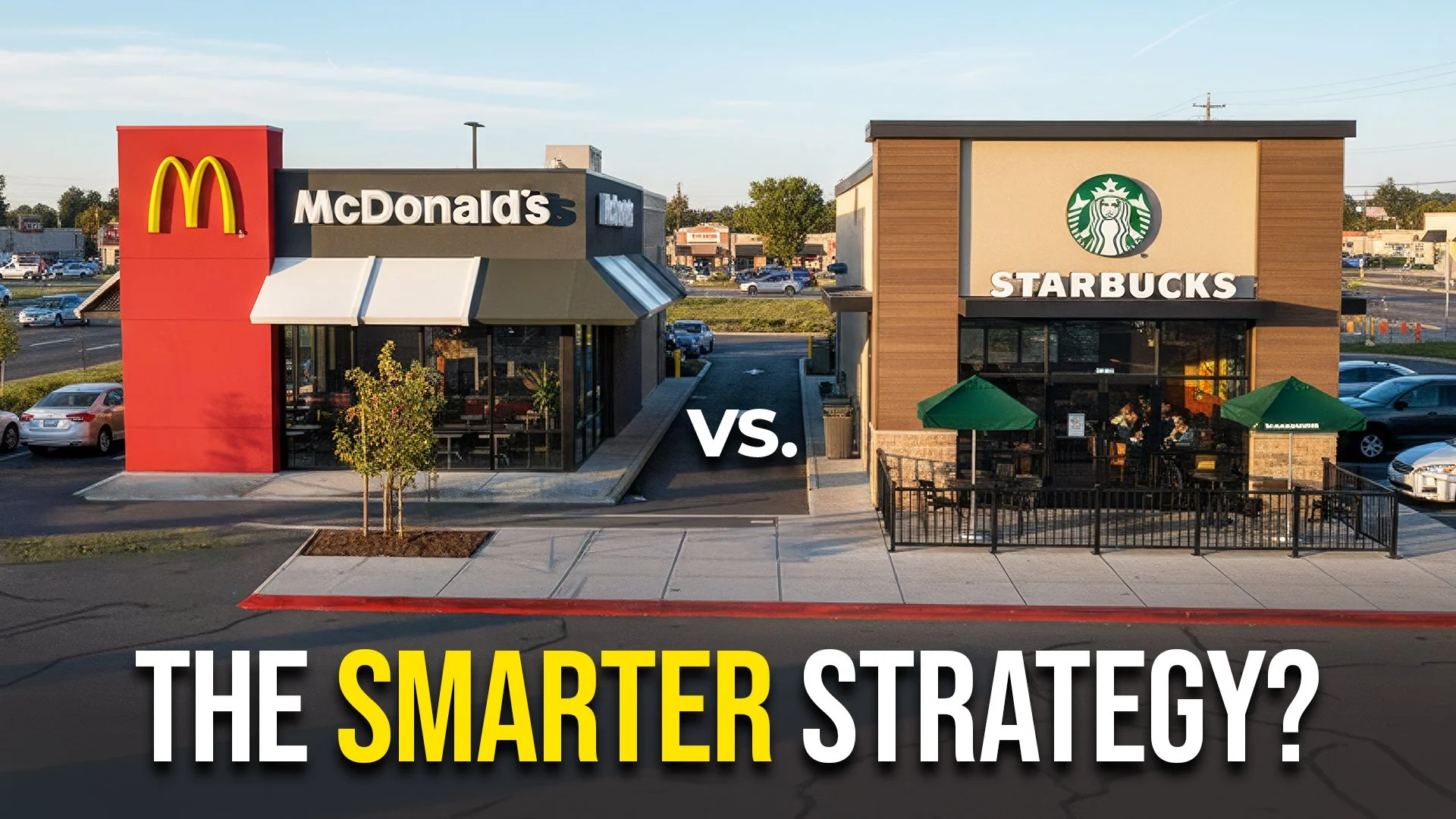Off-Market Mastery: How to Find Unicorn Deals in Any Market | Brokers Round Table
The best deals never hit the market—and the best brokers know how to uncover them. In this no-fluff session, Chad, Jesse, and Adam unpack the exact tactics they’ve used to uncover high-margin, off-market opportunities. From building referral pipelines to leveraging tech and data to think like an investor, you’ll learn how to source smarter, move quicker, and build a reputation as the broker who always brings the deal.
We cover:
- Direct-to-owner deal flow
- Partnering with investors
- Data and AI
Key Takeaways:
Relationship Building
Maintain constant communication with property owners (quarterly or at least annually)
Reach out with market updates, recent deals, or just to check in
Prospecting Strategies
Lead with specific tenant requirements
Track potential tenants and market movements
Use AI tools like ChatGPT to analyze property data and narrow down prospects
Deal Flow Techniques
Build relationships across different market segments
Leverage tenant representation to create deal opportunities
Consider co-investing to add more value and understand ownership perspective
Technology and AI Tools
Use platforms like Placer.ai for retail market insights
Utilize AI for email drafting, data analysis, and communication
Leverage tools like Read AI or Otter for meeting transcriptions and team management
Networking and Visibility
Post about your deals on LinkedIn
Establish yourself as an expert in a specific real estate vertical
Stay top of mind by sharing market updates and transaction information
Check out CRE Central: www.crecentral.com
About Your Host:
Tyler Cauble, Founder & President of The Cauble Group, is a commercial real estate developer and investor based in East Nashville. He’s the best selling author of Open for Business: The Insider’s Guide to Leasing Commercial Real Estate and has focused his career on serving commercial real estate investors.
Episode Transcript:
Tyler Cauble 0:00
This episode of the commercial real estate investor podcast is brought to you by my cre accelerator mastermind, where you'll get access to my step by step investment blueprint, essentially a library of resources on how to invest in commercial real estate. You'll get connected to a supportive community of other commercial real estate investors that are doing projects just like you, you'll get personalized coaching and feedback from me every step of the way. Go to www dot cre central.com to learn more. Welcome back to the commercial real estate investor podcast live from the combo group Studios here in Nashville, Tennessee, as always, and today, we're back for another round of office hours every Tuesday, 8:30am Central Standard Time going live and answering your questions around Commercial Real Estate. Today, we're going to do things a little bit differently. I'm going to dive into what I've been up to this past week, and then, of course, we'll get to your questions. But while we're waiting for those to come in, I'm going to share with you 12 lessons that I have learned over 12 years in commercial real estate, 12 lessons that I wish that I had known when I was first getting started, because that probably would have been pretty helpful. Anyways, this past week, Wednesday night, we had the ULI urban land Institute's excellence in development awards. Incredible event. The cobble group is a sponsor for Uli, Nashville this year. So we had a pretty nice table, which was which was great. I didn't have any projects that were up for the awards, so I was just attending as a fan, watching some amazing projects when and some amazing projects that didn't win, that probably should have went one. But the competition at these things is pretty steep, because these are amazing projects, got to see some really cool ones. So if you ever want to go to any sort of commercial real estate event that is showing you how other people are actually pushing the envelope when it comes to commercial real estate investment and development, you have to check out the annual excellence in development awards at the Urban Land Institute. Thursday, I had an all day board retreat for the Entrepreneurs Organization, pretty excited to be putting together what we are there. This is my second or third year on the board at EO Nashville, and I've always enjoyed it. You know, being an entrepreneur is a pretty big part of me, because I love working with entrepreneurs. I am an entrepreneur, and so it's a lot of fun getting to serve on the board and actually have an impact. You know, Nashville has one of the largest chapters in the world. I think it's the third largest Entrepreneurs Organization chapter in the world. Over 350 entrepreneurs in Nashville our members, which is pretty cool, Thursday night, as soon as we were doing with that board meeting, I flew up to Pittsburgh to consult with a family Office client that we have up there. Working with family offices is something that I've been getting more and more into here recently. I have several family offices that I consult kind of all across the country that are what I would call burgeoning family offices, right? These aren't the established billion dollar family offices. These are, you know, typically second and third generation individuals who, you know, they've got a portfolio under $100 million and probably typically above 10, you know, so probably in that 10 million to $100 million range. And they don't necessarily have formalized processes around how they're actually going to invest as a family. They don't have an investment philosophy. They don't have that why behind why they're continuing to invest. And, you know, there's there's no governance, there's no intent. It's just, hey, grandfather started a company and we started buying up real estate because of that, or dad started a company, and we started buying up real estate because of that, and we knew that buying more commercial properties was a good idea. And so falling into that and continuing to buy more commercial real estate has gotten these families into incredible positions, especially when you think about buying real estate over 3040, 5070, years, of course, you're going to have some, some pretty incredible assets at that point, but you need to have a formalized process around it, right? You need to start treating your commercial real estate investment portfolio like a true investment portfolio. And so that's, that's what I do, is I typically go in and work with them, on on creating those systems, putting together the portfolio strategy, reviewing the assets, which ones should we sell? Which ones should we keep? Which ones are the, you know, the core cash flowing ones that we've got to rely on. How much money should we be distributing to the family each each month, each year? Because more often than not, what I see is is most families at the end of the year are scraping all of the funds out of it, because why not? But the problem is that doesn't stand on its own. You don't have a business, a true business, that could stand on its own, that can afford to continue buying its own assets. So it's important to set that up the right way. Then Saturday night, I flew to Chicago for a business dinner that I had there, which was, uh. Pretty great, excited to see where that relationship could go. And then yesterday, Monday, had a site tour with alinder on a at a hotel that we're looking at converting into micro apartments. Some of you all may be familiar with the sohana project that we consulted on, that we worked on back in 2020, 2021, and you know, I kind of came in and finished out the development of it. We had our property management team take over. We signed 124 leases in six months on 215 or 216 square foot units. I mean, thick motel room converted into an apartment unit. Pretty incredible product. And actually, one of the projects that won an award at the Urban Land Institute's excellence in development, was a motel to apartment conversion, and so excited to see what we could do with that, because we've got some pretty big capital on board with that project. So it could be a could be a pretty interesting thing. We'll see where it goes. Question of the day today, going in line with the 12 lessons that I'm going to share with you all what's the most important lesson that you have learned in real estate. Doesn't necessarily have to be commercial, doesn't necessarily have to be investing. It could be on the brokerage side. Jump in and let me know what the biggest lesson is. But let's go ahead and dive in. I'm going to share my 12 lessons learned over 12 years in commercial real estate. So number one, you don't find great deals. You create them. The wash is a great example of this. That project was on the market, and nobody wanted to buy it because it was six, six bays. It was a six big car wash that was totally run down. The land was too valuable, and the equipment needed to be fully replaced. So they wanted, you know, $412,000 for it, and it made zero sense as a car wash, right? But when I reframed it and looked at it as retail, looked at it as restaurants, it was a steal. It was a total steal for the land. And so don't think that you're just gonna happen upon a great deal. You got to actually put the work into it, right? So that means work on some stuff off market. Maybe you go through an entitlement play, you go through a rezoning with it. You could even explore seller financing and other value add strategies these. It's not luck, right? You're actually going out there and creating this, right? So go out there and create the deals, especially today, I think that today is one of those times where a lot of investors are hoping that the right deal just comes their way, and it's not. This is the time where you've actually got to sharpen your pencils and get to work. Number two, reputation compounds faster than capital. If you have the best I will take the person with the best reputation in the world over the person with the most money in the world any day, because the person with the better reputation will be able to tap into everybody else's capital. They don't need their own capital, right? Your name is your brand when it comes to real estate, that's that's something that a lot of people don't take seriously enough, in my opinion, always do the right thing. Say what you're going to do, don't burn bridges. This is a long term game. Treat it as such. Number three, chasing cash flow can keep you poor. I know. Let that sink in. Chasing cash flow can keep you poor. Many investors get obsessed with monthly cash flow, and I don't think that there's necessarily anything inherently wrong with chasing after monthly cash flow. The problem is the deals that are going to cash flow better are typically hairier deals. They're not the greatest deals. And real wealth in commercial real estate is heavily built on equity, heavily built on equity. So don't think about just chasing cash flow right. Make sure that you are actually going out and you're, you're, you're paying attention to the appreciation, the forced value creation, even strategic exits, you know, especially when you're first getting started, you don't necessarily need the cash flow, right? The cash flow comes later. When you're ready to retire, you're ready to spend more time directly with your family. And I get that, that's what a lot of investors are going for, 10k a month in passive income, 20k a month in passive income. I mean, I've got, I've got clients that are making 120k a month in passive income. They didn't start off going for the cash flow, though, they went all in on building their net worth, right? So that's that's an important thing to keep in mind. Number four, and some of these are controversial, or at least a hot take, so keep that in mind as we're going through this number four, control is more valuable than ownership. Doesn't matter if it's a master lease, an option, seller financing with a delayed close. As long as you control the deal, it doesn't really matter who holds the deed. You could have 1% in a deal if you control it,
you have the power. Right? Smart Control beats sloppy owner. Ship every single time. We see this all the time, with people who have a lot of ownership in a deal, they have no idea what they're doing and and I mean, you know, I've come into deals before where I've gotten a super minority share because I didn't have to put anything into it. Call it seven and a half, 10% in a deal, because the current owners at the time. Didn't know what they were doing with the asset, and they had screwed everything up to the point where they needed a turnaround guy. So I was able to come in as a turnaround guy. Number five of the 12 lessons learned. One great relationship can change everything. All you need is one great relationship. It doesn't have to be five, it doesn't have to be 30, it doesn't have to be 100 All it takes is one person, one capital partner, one broker that has the right listings, the right pocket listings, right a city official that maybe goes out and actually advocates for you and for your project. This is a relationship business. No man is an island when it comes to commercial real estate. So invest in people before you invest in deals. It is way easier to get a deal done when the neighborhood likes you, when everybody you know, the council member, likes you, when the brokers like you, than it is to just come out and try and cut corners and and, you know, make an extra buck by ripping other people off. Because eventually this is a small industry, and you will lose out. It's it's going to happen. I promise, I've seen it time and time again. Let's see number six, the first deal feels the hardest, because it is that would seems pretty, pretty obvious, but I also, I see, I see a lot of people get spoiled by their first deal. And I'll kind of elaborate on that here in a second. But look that first deal I get it. I've been there. It's an emotional roller coaster, you know? I mean the analysis paralysis, wondering if what you're doing is right, if you're remotely correct in your assumptions. You know, I remember the first deal that I ever did, that I ever raised capital for. So it was technically my second deal, because I did a development first deal that I raised capital for was a little 6000 square foot office building, tiny deal, $575,000 I mean, nothing compared to what we're doing today. And I couldn't sleep the night before because I was so worried, like I'm taking $100,000 in investor capital. Am I gonna let these guys down? What if I'm wrong? What if this? What if that? And you know what the thing was. And I thought that this was pretty amazing, and this has stuck with me ever since. I'll never forget the feeling of going to the closing the next day, signing a couple of documents, and then the title agent looking over me and going, congrats. I was like, Wait, that's That's it. Like, I just bought a $600,000 property and took out another $120,000 line of credit, and that's it, you know, it's, I mean, it's like, hitting your first seven figures in net worth. It really doesn't like, it's, it's this goal that you feel like, you know, you've been pushing towards for so long, and then you cross that line, you're like, oh, okay, that's that doesn't, I don't feel any different today. It doesn't change anything. But you have to go through that first one to realize that, like, it's so much easier to be on this other side to say, Oh, well, don't worry about it. Like everything's gonna be fine. It will be but you're not gonna hear that, because you're still the one that has to go through that emotional roller coaster. So the only way out is through build that momentum. I mean, seriously, it took me four and a half years to go out and raise capital and buy my first deal, and then that year, I bought three more properties, because I realized how easy it could actually be. I know we've got some questions coming in, and we'll get to those as soon as I get through these 12 lessons learned. Number seven, you can scale faster by focusing smaller, inch wide and a mile deep. Don't go out and think that you need to dominate an entire city to win. Pick a neighborhood, pick a very specific niche, right? Maybe you don't even do flex space. Maybe you do micro flex, right? We were having a conversation in our mastermind last night about, you know, is 2000 square feet for flex space too much. Maybe. Has anybody tested out 1200 square feet? I mean, absolutely, it's been done before, but 1200 square feet allows you to charge a higher price per square foot. And the tenants don't hardly notice that, because they're just looking at it on a monthly basis. And if you're just a, you know, small business, you're you're a startup business. You need a tiny little office and a warehouse to store some stuff, right? That's all it is. You don't need a massive space. So why not go out and pick you know, niche down even further, right? I personally picked the neighborhood niche, right? The you know, as Mark deutschman calls it, if you saw my lessons learned podcast with him, the one mile radius. I mean, he dominated that, right? And I was actually working on that exact same thesis before I came across his book. And I was like, Oh my gosh, everything is so validated for me. And I went all in on it. It was back in, you know, 2017 give or take. So 2018 So we went all in on East Nashville. So I think it's important to keep all of that in mind. You don't need to dominate an entire city to win. Pick a street, pick a neighborhood. Number eight, brokerage is the best entry point for beginners. I mean, I might be a little bit biased, because that is how I got my start in commercial real estate, but brokerage is the best entry point for beginners. Now, if you're 50 years old and you've got $5 million in cash sitting around ten million whatever, probably don't get don't get started in brokerage. You've got the cash, you've got, you know, you've got the resources to go out and have somebody else find deals for you. But if you're wanting to break into commercial real estate. The best thing that you can do is to help other people buy their deals. Right? If you want to learn how to buy commercial real estate, go work for somebody that's buying commercial real estate. You get to learn how they look at deals. You get to learn how to find deals. What makes these deals work, what it's like having a conversation with a lender, what it's like walking through as an investor, and what you should be looking for. I learned so much in my time as a commercial real estate broker that I get to apply every single investment that I do. It's pretty amazing. And you get to learn how to handle the lease up, how to run comps, how to analyze markets all in somebody else's dime. You're literally getting paid to go do it for other people. So why not? And if you build good enough relationships with them, they may be willing to partner with you on that right number nine, come on, we all know this one. If you are the smartest person in the room, you're in the wrong damn room. I always like to say, I want to be the stupidest person in the room, right? I want to be the dumbest person in the room, because if I am, that means that I'm in a pretty good room, right? That means I have something to learn from every single person in that room. That means that everybody else is so much further ahead of me. They have the experience that I can borrow instead of having to go and earn on my own. I would much rather learn from some other person touching a hot stove than to touch it myself. Join the masterminds. I still pay a lot of money every year to learn from other people on how to run a business, better, how to do YouTube, better, how to do commercial real estate, better. Hire coaches, surround yourself with people that are doing bigger deals with you. I think that's one of the most impactful is just who are the five people that you're surrounding yourself with, and what are you learning from them? Because if they are not all in on commercial real estate, you know, I mean, look, I've got buddies from from high school that are still great friends with me. I'm still great friends with them, like I'm going to, you know, everybody's weddings. And we hang out all the time, but we're not hanging out every day, right? We're hanging out, you know, once a month, once every few weeks, the people that I spend the majority of my time with are all in on commercial real estate, and that's because it's, it's kind of a lifestyle choice for us, to be honest with you, so you'll never grow if you stay within your your comfort zone. So get out of it. Go meet some other people. Number 10, the best way, the best time, the best time to build your brand, was five years ago. The second best time is now. Time is now. We talked about this a little bit earlier, but, you know, I have always been big on marketing and branding. Really went in on it probably two years into the business. When we were I was doing my first development project, I spent a lot of time coming up with the name, how we were going to market it, who our target demographic was, how we were going to approach them. Then that led to me going all in on on Instagram for commercial real estate. I was very early on Instagram for commercial real estate. Then that led to the blog and to YouTube and the podcast. And you know, everything sets.
What you share with the world is your brand, what the content that you put out there is your credibility. And in today's market, that attention is currency. If people don't know who you are, it's not really easy for them to send you deals or to give you money. So go out there, share your thoughts on things you don't let the fear of putting your opinion out there hold you back. You know, I remember when I first started saying that I think residential is a horrific investment and that nobody should ever buy single family homes. Right? Very controversial at first. I used to have people arguing with me left and right when I would say that now we're, you know, five years into my continuing to say that, and I don't really have people arguing with me anymore, because the people that resonate with that are all in agreement, right? They're all here watching this YouTube channel. It's, it's, yeah, actually, I don't like residential. Either I'm tired of dealing with it or, yeah, I don't really want to deal with residential. I don't want to jump into that market. They resonate with that ideology. That's how you can go out and find your audience. So whatever your opinions are, whatever your hardcore opinions are, go out and share them. It doesn't hurt to put it out there. I mean, unless it's just like a bad opinion or just a dumb opinion, I don't know what to tell you at that point. Sorry. You're gonna have to figure that out on your own. Number 11, development will. Test every single part of you. Development will test every part of you. Development is the sexy aspect of commercial real estate. I feel like a lot of people that are that have never done a development before see development as like, that's the way to make all the money. That's the way to, you know, get all of the notoriety in commercial real estate. And to some extent, that's, that's certainly true. I think, though, that commercial real estate development is, I mean, obviously, like, I don't think this. This just is a fact. It is the hardest thing hands down that you can do in commercial real estate. And in my opinion, the reward is not always as good as it can be if you do something else, right? I've got projects where all we did was come in and do a little bit of value, add, sign a couple of leases and flip it, and I made more money faster than I would have if I had gone through, you know, a two or three year project where I had to get approvals for my architectural plans, which took six months to pull together. The approvals took another six months. The construction took 18 and it's great, you'll make a lot of money. Don't get me wrong. Development is wonderful, and I still do it, but it's just, you know, it's rare, it's on occasion, it's, it's, it's a great way to create generational wealth. It's a fast way of doing it. But don't let anybody ever kid you. The development is remotely easy. It's not you will get decision fatigue. It is incredibly difficult. Number 12, last, but certainly not least, you're just one property away from completely changing your life. One warehouse, one flex space, one strip center, one $1 million property. It's, it's really not a pipe dream. I mean, like I was saying earlier, that first property that I bought, it was 2019 I developed a project starting in 2015 we kind of closed it out in 18 or 19. The first deal that I actually went out and raised investor capital for was in 2019 not that long ago, six years ago, and as soon as I got across the finish line, I bought three more that year. You know, 2020 changed my wife in terms of some of the other acquisitions that we made. But all it took was getting that one across the finish line, and it totally changed the trajectory of what I was doing. Just that one property, and it was a small one. It was $575,000 so if you're out there and you're thinking about getting your first commercial property, just get a single go for a single you don't need a home run for your first deal, get a single. Mine was $575,000 I'm under contract right now on a $10.4 million property, not even remotely in the same ball field, but I couldn't be doing the 10 point 4 million 4 million if I hadn't started at 575, and then bought a 980, and then bought a 1.3 and then bought a three. And then, I mean, it compounds, right? Like it took me years to build up to that point. And, you know, I think it's, it's kind of like tree estate and treat real estate investing in general, just like a professional sport, right? You're not going to go from middle school straight to the pros just because you'll you want to be in the pros, and that's dangerous. You're probably going to get hurt, or you're going to lose the love of the game because you don't have the skills and the ability to compete at that level grow slowly. This is a long term game treated as such. It's a marathon. There you have it, 12 lessons learned over 12 years in commercial real estate. Let's get to you all those questions, because we've got a bunch of stuff in the chat. Troy is saying, Hey, Tyler, I feel like we are constantly in over our head with our first mixed use property. The city keeps placing Roblox in front of us to approve of use. They are now asking to have an engineer come in and assess the property. It's an old tire shop converting to mixed use. Event space in 4500 square feet, food vendor, mixed use build a suit another 3500 square foot, with commissary and 800 square feet, what is your opinion on dealing with the city Troy? Couple of things. I mean, I would ask like, Do you have a very solid civil engineer working on the project that is well connected? Having a civil engineer that is like a talented civil engineer goes well beyond just the horizontal drawings for a property, they have connections with the city. They're dealing with the city all the time. They know exactly what the city wants to see, and so having them on board and working on this project with you is an incredible way to maybe not even necessarily fast track what you're doing, but to make sure that these roadblocks don't keep popping up, because they have those conversations before they ever happen, and they make sure that the project is designed to bounce around that I mean, the last rezoning that I did, my civil engineer handled almost everything, almost every single meeting, every single conversation I went to the. Town hall event, and I was the one that spoke to to the neighborhood. But outside of that, I mean, he handled all of those conversations with Metro, the council member, etc. And so having a good civil engineer involved is worth its way to gold. Doug is saying, for any brokers, or for brokers, any tips to source a calling list for potential listings or investments have access to costar or just get out there and door knock. Doug, you know what I would do? Not a fan of costar. I don't think their data is that accurate. That's my opinion. You know, as far as you know, sourcing a calling list, I mean, you can go on and, I mean, typically, the best thing to do is just pick a neighborhood right go through and go one by one. This is a sniper approach. It's not a it's not a shotgun approach. You're going to build a database in that neighborhood, and you're going to start working on it right now, so that one year from today, your life is substantially easier, but right now it's going to be tough. You've got to go property by property and go through the white pages, go through some sort of skip tracing to find the contact numbers for every single individual property that you'd be interested in selling, and again, take the sniper approach. Maybe at first you're making five calls a day, because it takes you so long. But one year from now, when you've got an entire database, you'll be able to make 100 calls in a single day, because you already spent the time building that up. So that's what I would do, is just slowly build up that database and then that like, that's what the value is of being a commercial real estate broker, is having that database. If there was an easy way to do it, there'd be zero use for a commercial real estate broker, in my opinion. Cam, what advice would you give to a 22 year old who aspires to be a developer, to get into the commercial real estate world? Cam, hopefully you just heard what I was saying about development, but I would go work for a development company first spend five to 10 years with them, learning how they put these together, learning the ins and outs of what an actual development project looks like, and then go off on your own. That's what I would do, go work for a development firm. Kevin, what's your take on using AI tools to streamline sales or operations in real estate investing, like automating lead follow up, appointment setting or property analysis, my opinion, Kevin, if you are not using AI to make your business easier, to make your work life easier, what in the world are you doing today? You are so far behind. So 100% agree with you on that. Jump in on it. Utilize the tools. I mean, one of the greatest things that I've you know, I fired my property manager a few weeks ago, and so I've had to step back in and start taking that over and the ability to just drop commercial leases into chat GBT and ask it to respond to a specific email for a tenant and to cite the the actual sections and paragraphs that it is. You know, pulling from in the lease is pretty powerful. It's amazing, because something that would normally have taken me two hours to do now takes me five minutes. So I'm a big fan. I think that we're screwed. We haven't even scratched the surface as to what AI is going to be capable of doing. You know, we could talk about the the potential downsides
of our new AI overlords, but I, for one, will accept them, and I say please and thank you whenever I talk to chat. GBT, that is it for today. Guys, thank you all for jumping in on this week's office hours every morning, every Tuesday morning, not every morning that'd be crazy every Tuesday morning, 8:30am Central Standard Time, jump in, ask your questions. If you're listening on Apple podcasts or Spotify, don't forget to rate and review. If you're watching on YouTube, hit that like and subscribe button and I'll see you guys in the next one. This
episode of the commercial real estate investor podcast is brought to you by my cre accelerator mastermind, where you'll get access to my step by step investment blueprint, essentially a library of resources on how to invest in commercial real estate. You'll get connected to a supportive community of other commercial real estate investors that are doing projects just like you. You'll get personalized coaching and feedback from me every step of the way, go to www dot cre central.com to learn more. You.





